|
|
|
Sort Order |
|
|
|
Items / Page
|
|
|
|
|
|
|
| Srl | Item |
| 1 |
ID:
186201
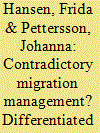

|
|
|
|
|
| Summary/Abstract |
While the construction of migration as a security threat in Europe has been thoroughly examined, how different groups of migrants become targets of security concerns has not received similar attention. In its fight against irregular immigration, the European Union uses visa liberalisation agreements with neighbouring states as an incentive for cooperation on migration control. At a first glance, this strategy appears somewhat contradictory, as visa liberalisation potentially increases the share of visa overstayers among irregular migrants. Through analysis of the annual “Risk Analysis” reports between 2015 and 2020 published by EU’s border and migration management agency, FRONTEX, this article shows that visa overstay is routinely left out of the agency’s security concerns of irregular migration, thus rendering risk assessments asymmetrically occupied with irregular migration by means of “illegal entry”. Although visa overstayers are not conceptualised as threats to security in discourse on par with other categories of irregular migrants, we find that they are increasingly subjected to a rationale of surveillance and risk.
|
|
|
|
|
|
|
|
|
|
|
|
|
|
|
|
| 2 |
ID:
080877
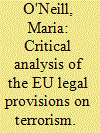

|
|
|
|
|
| Publication |
2008.
|
| Summary/Abstract |
Terrorism activities within the EU are essentially transnational. Given that counter-terrorism operations and prosecutions have been allocated to different actors in different EU member states, operating within quite differing legal provisions and systems, co-ordination by the EU in this area is to be welcomed. In addition to critically examining the new EU laws in this area, this paper focuses on legal framework for the interaction of police, security services, and judiciary across Europe in this task, to include Europol and Schengen provisions. It also pays particular attention to the divergent positions of the UK and Ireland within this framework.
|
|
|
|
|
|
|
|
|
|
|
|
|
|
|
|
| 3 |
ID:
138870
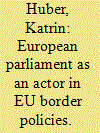

|
|
|
|
|
| Summary/Abstract |
This contribution focuses on the European Parliament (EP) as an actor in European Union (EU) border policies. It situates the Parliament in the dynamics of the Schengen project and discusses the distinct role it plays therein, as well as its impact thereon. The article argues that the EP managed to establish itself, years before the entry into force of the Lisbon Treaty, as a credible actor in border policies able to bring the citizens’ perspective into EU border policies. With its keen interest in the Schengen area as an area in which citizens can move freely without being subject to border controls, and with its focus on fundamental rights, it played, and continues to do so, a role in ensuring that “Schengen works”. The article presents its powers and the interplay with the other EU institutions, mainly on the basis of a number of key examples.
|
|
|
|
|
|
|
|
|
|
|
|
|
|
|
|
| 4 |
ID:
120833
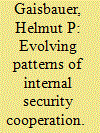

|
|
|
|
|
| Publication |
2013.
|
| Summary/Abstract |
This article discusses evolving patterns of internal security cooperation that start in the realm of international public law and end up more or less entirely in the treaty framework of the European Union. By applying the theory of clubs (Buchanan) it shows the fertility as well as limitations of a public goods approach to analyse and explain such instances of differentiated integration and to assess their effectiveness. By way of the comparative analysis of the Schengen regime and the Prüm Treaty it analyses five main stages of an internal security club's life circle from the causing obstacle (blocking of a certain policy) to the final incorporation endgame. Both clubs under investigation produced so-called network goods with negative rivalry logic, i.e. the more members participate and 'consume' the good the higher the benefit for all. However, it is also shown that club formation and expansion could not only be understood as a strategically rational process, and that various contextual costs inhibited the formation and eventual expansion of the clubs. The article concludes that incorporation efforts necessarily lead to pick-and-choose situations that preclude full uniformity; consequently, outside treaty clubs tend to create á la carte fragmentation to a certain degree.
|
|
|
|
|
|
|
|
|
|
|
|
|
|
|
|
| 5 |
ID:
101145
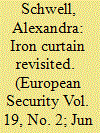

|
|
|
|
|
| Publication |
2010.
|
| Summary/Abstract |
Since 1990 draftees of the Austrian army have been stationed at the border to Hungary, and later to Slovakia, as a reaction to both the system change in Eastern Europe as well as the expected increase in cross-border crime. This so-called 'support deployment' was initially planned to last no longer than 10 weeks, but soon it became apparent that the military's border security deployment could also serve other ends than mere security goals. Since then it has been prolonged numerous times. In scrutinising the strategies of the various actors involved, the paper shows that the support deployment can be considered an act of securitisation and is as such almost entirely decoupled from the actual policing of the Schengen internal border. Furthermore, it argues to 'bring the audience back in' and to recognise the audience's agency in the analysis of securitisation processes.
|
|
|
|
|
|
|
|
|
|
|
|
|
|
|
|
| 6 |
ID:
101142
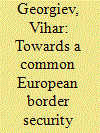

|
|
|
|
|
| Publication |
2010.
|
| Summary/Abstract |
The internal abolition of borders in the European Union (EU) has created a security deficit that is supposed to be compensated by inventing a new border - the 'external frontier' - which is to protect the combined territory of the Member States. This article argues that the security deficit has not been fully compensated for due to uneven policy implementation. The overview of impending threats to the EU border security system stemming from climate change impacts and demographic pressures shows that the future holds even greater challenges to the implementation of the Schengen acquis. A new approach to border security is urgently needed. The introduction of a common European border security policy can become an adequate response to many of the otherwise imminent threats.
|
|
|
|
|
|
|
|
|
|
|
|
|
|
|
|
| 7 |
ID:
129486
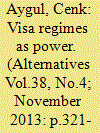

|
|
|
|
|
| Publication |
2013.
|
| Summary/Abstract |
This article examines the significance of labor mobility for capitalism and analyzes the visa regimes of the European Union (EU) and Turkey. After the fall of the Berlin Wall, labor mobility originating from Eastern Europe has been redirected to the West, taking the form of circular migrations and replacing the previous rotation system. While the new forms of circular mobility created insecure employment conditions for many people, it also required a visa regime to classify people when they arrive at the borders. Both nation-states and supranational organizations such as the EU continue to build regulatory capacities. The second half of the article examines the Schengen agreement and the ways in which French German sensitivities were "communitized." While other East European countries chose to be a part of the Schengen agreement's restrictive visa policies, this option was not possible for Turkey, which established a fully liberal regime.
|
|
|
|
|
|
|
|
|
|
|
|
|
|
|
|
|
|
|
|
|